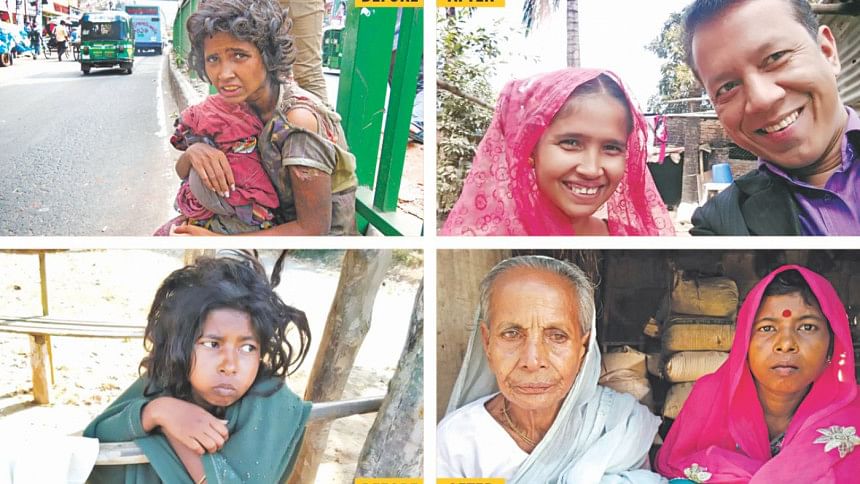Selfless love for the helpless

With tangled hair and ragged cloths, she moped around footpath shops at the Paltan intersection, whining for handouts. Her ill-nourished, thin body was crusted with dirt all the time and she lived on alms she begged from shop to shop.
One day in August last year, a man noticed the girl, aged around 20. He gave her food for a few days on his way to and from office. When closeness developed, he took her to a hospital. After she recovered from her mental distress, the man helped her reunite with her family.
It's a story of a man whose relentless effort, love and care for homeless people suffering from mental problem to help them start their life anew.
When most people in the society turns a back on them, Shamim Ahmed, a 42-year-old banker, dares to take it upon himself to make sure that they live their normal life, and live it well.
"You can't imagine the happiness when you make one such person smile and help him or her to get back to normal life," said Shamim, who works at a private bank in the capital. One of his colleagues, Ali Sabbir, helps him in this endeavour.
The girl he found at Paltan is Joba whom he adoringly calls Aduri (meaning adoring). But she is not the first one Shamim helped.
In March last year, he helped another such girl, Sheuli Rani Sarkar, to find her family.
Shamim first saw Joba at Paltan when he was returning to his Adabar home from his office in Dainik Bangla area. After seeing her for some days, he tried to talk to her one day. He gave her a packet of biscuit and Tk 10 and the girl walked away taking those. Shamim kept doing that for three months, and decided to arrange for her treatment.
Shamim and his colleague, along with their families, took her to the National Institute of Mental Health, with permission from Paltan police.
"At the hospital, she could not say anything clearly. That's why we named her Aduri," said Shamim, father of two daughters aged ten and six.
There, he appointed Jarina Begum, a domestic help, for her care. Joba was recovering gradually and began to speak more clearly.
"Her accent suggested that she was from Noakhali," said Shamim, who used to visit the girl at the hospital almost daily.
After she was released from the hospital one and a half months later, Shamim kept her at Jarina's house.
"One day she told us that her home is at Narayanpur in Maizdee of Noakhali," he said.
The two colleagues sent a man to the area to paste some posters with Joba's photo in them. While sticking the posters on walls and trees in the area, the man found Joba's family in Laxminarayanpur.
Her father came to Dhaka the next day to take her home.
"We finally came to know her real name. She got lost around six years ago while working as a domestic help in her village," Shamim said.
Shamim kept her at Jarina's house for three months in case she needed further treatment. Then on March 9 this year, they handed over Joba to her family.
"We have a plan to give her a sewing machine," he said.
Joba's father said her daughter's condition was better now, but she needed to take medicine, which Shamim sends regularly.
"It is difficult to find a man like Shamim. He is the reason why I got back my daughter after so many years. I pray for him," said Joba's father.
"He is a very good man," said Joba.
The story of Sheuli is even more encouraging.
The 25-year-old from Sarail upazila of Brahmanbaria went missing around seven years ago. After giving birth to her third child, she developed a mental problem, Shamim said, citing family members.
One day, she left home.
During a trip to Bandarban in December in 2014, Shamim and his colleagues saw her sitting under a tree in Thanchi. Two days later while heading back to Dhaka, they saw the girl in the same area.
"I felt for her. I thought of doing something for her," Shamim said.
In Dhaka, he spoke with his colleagues but did not get much response, except from Ali Sabbir. They decided to bring her to Dhaka for treatment.
After facing a volley of questions from the local authorities, they managed to bring her to Dhaka and have her admitted to the National Institute of Mental Health in March last year.
She too could not tell her name so they named her Antar. As she got better after two months' treatment, Shamim kept her with Jarina, the house help. During her stay there, she often said, "Chandura Bazar".
It's a place in Brahmanbaria, Shamim found out.
Two days after pasting posters in the area, they found the family. When her husband Falan Sarkar, the kids and other family members came to Dhaka, she recognised them all. They went home, where Shamim still sends medicines for Sheuli.
"Both Aduri and Sheuli call me father. It gives me immense pleasure and peace."
Ali Sabbir said they would continue to help the distress.
Why does Shamim do this? First, his parents always encouraged him to do social work. Secondly, there is hardly any organisation that works for the mentally distressed people who live on the streets.
"We should do something for these people because our little effort can change their lives for the better," he said, adding that he has full support of his family in his endeavour.
The two colleagues plan to build a hospital for the treatment of such people.

 For all latest news, follow The Daily Star's Google News channel.
For all latest news, follow The Daily Star's Google News channel. 




Comments